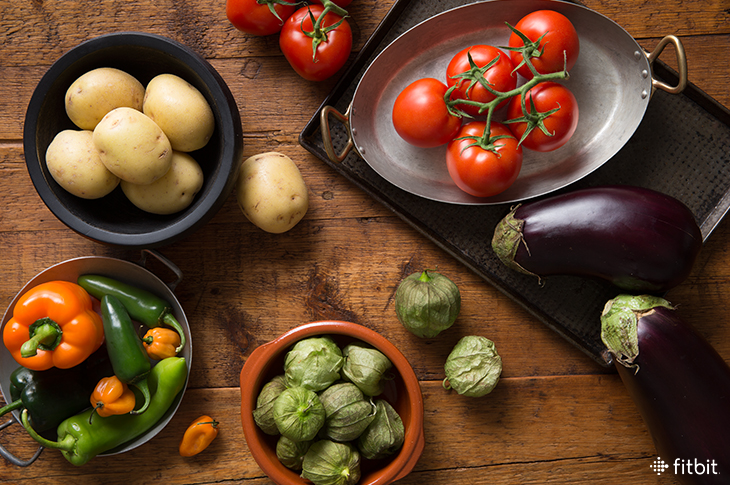
Elimination diets are incredibly popular right now, from giving up gluten to avoiding inflammatory foods. Some people have real medical reasons to say no thanks to certain foods—if you think you might have an intolerance or an allergy, or if you are dealing with unresolved health issues, it’s important to talk to your doctor. But lots of people are playing around with paleo and other restricted diets on their own, hoping to feel great, and of course, lose weight. Now, there’s a new scapegoat on the list of foods to avoid—nightshade vegetables. Yes, vegetables!
Wait, What Is a Nightshade?
Nightshades, or more formally, Solanaceae, are a family of plants sometimes recognized by their elfish green caps. The nightshade family includes some beautiful flowers, which you wouldn’t want to eat, but also some of your favorite summer vegetables. Namely:
- Eggplant
- Bell peppers
- Chile peppers
- Tomatillos
- Tomatoes
- Potatoes (white, not sweet potatoes)
- Goji berries
If that sounds like a short list, keep in mind that there are many varieties of tomatoes and peppers alone, both fresh and dried. Paprika and cayenne are commonly used in many ground spice blends, making them almost unavoidable. From spice rubs, salsas, and ketchup to fajitas, moussaka, and caprese, you’re probably enjoying lots of nightshades, without even realizing it.
Some people like to point out that tobacco and belladonna are also part of the nightshade family. But those are distant relatives with much more menacing toxins. Eggplant and tomatoes can’t be accused of being poisonous or carcinogenic. But they do have something else going on.
Why Are Some People Sensitive to Nightshades?
Nightshade vegetables contain a natural pesticide, glycoalkaloids, which discourage insects and fungus. The highest concentration is typically in the leaves, but it can also be present in the roots and fruits. Keeping it in perspective, eggplant isn’t out to get you sick! It has simply evolved to keep pests from munching on its leaves. But even while glycoalkaloids are completely natural, they are considered a toxin. And some people do report bad reactions and unpleasant symptoms, including headaches, nausea, vomiting, and diarrhea, after eating nightshades.
“Some people who are sensitive may experience relief when eliminating nightshades,” explains Elaine Tang, a registered dietitian from the Stanford Nutrition Clinic. “And some people with arthritis, auto-immune disease, or people who have life-disrupting symptoms with their digestive tract do consider avoiding nightshades. They’re willing to make the effort to change their diet for the possibility of improving their quality of life.”
Could You Have a Nightshade Sensitivity?
Wait a beat before you clear out your crisper! “If potatoes, eggplants, tomatoes, and peppers have been part of your regular diet and you haven’t had any problems, you can likely continue eating them,” Tang reassures. “But if you notice you have joint or muscle pain or stomach discomfort after eating these items, it’s possible you have a sensitivity.” She recommends completely eliminating nightshades from your diet for about two weeks—a serious commitment, if you’re going to dodge every sprinkle of paprika! Then slowly reintroduce those foods, and see how you feel. If you start feeling lousy again, you might consider keeping up with this major lifestyle change. But if you don’t notice a difference, you can continue eating these otherwise nutritious foods.
Eat Your Colorful Veggies!
The more important point is that you want to enjoy your fruits and veggies—as many as possible, in as many colors as you can! While it’s a fact that nightshades contain a natural pesticide, and that some people experience sensitivities, most nutrition experts would hate to see you give up these vibrant veggies, unless you really have to. Paleo bloggers and holistic healthcare providers have their own opinions and theories, but more clinical research is needed to make better recommendations.
Eggplants, tomatoes, and bell peppers are a great source of fiber, phytochemicals, and antioxidants. They’re beautiful natural ingredients with rich and delicious culinary traditions. So as long as they make you feel good, enjoy those meaty eggplants, juicy tomatoes, and sweet and spicy peppers. They add color to your plate and spice to your life.
This information is for educational purposes only and is not intended as a substitute for medical diagnosis or treatment. You should not use this information to diagnose or treat a health problem or condition. Always check with your doctor before changing your diet, altering your sleep habits, taking supplements, or starting a new fitness routine.

If you have questions about a Fitbit tracker, product availability, or the status of your order, contact our Support Team or search the Fitbit Community for answers.
Please note: Comments are moderated and may not appear immediately after submission.